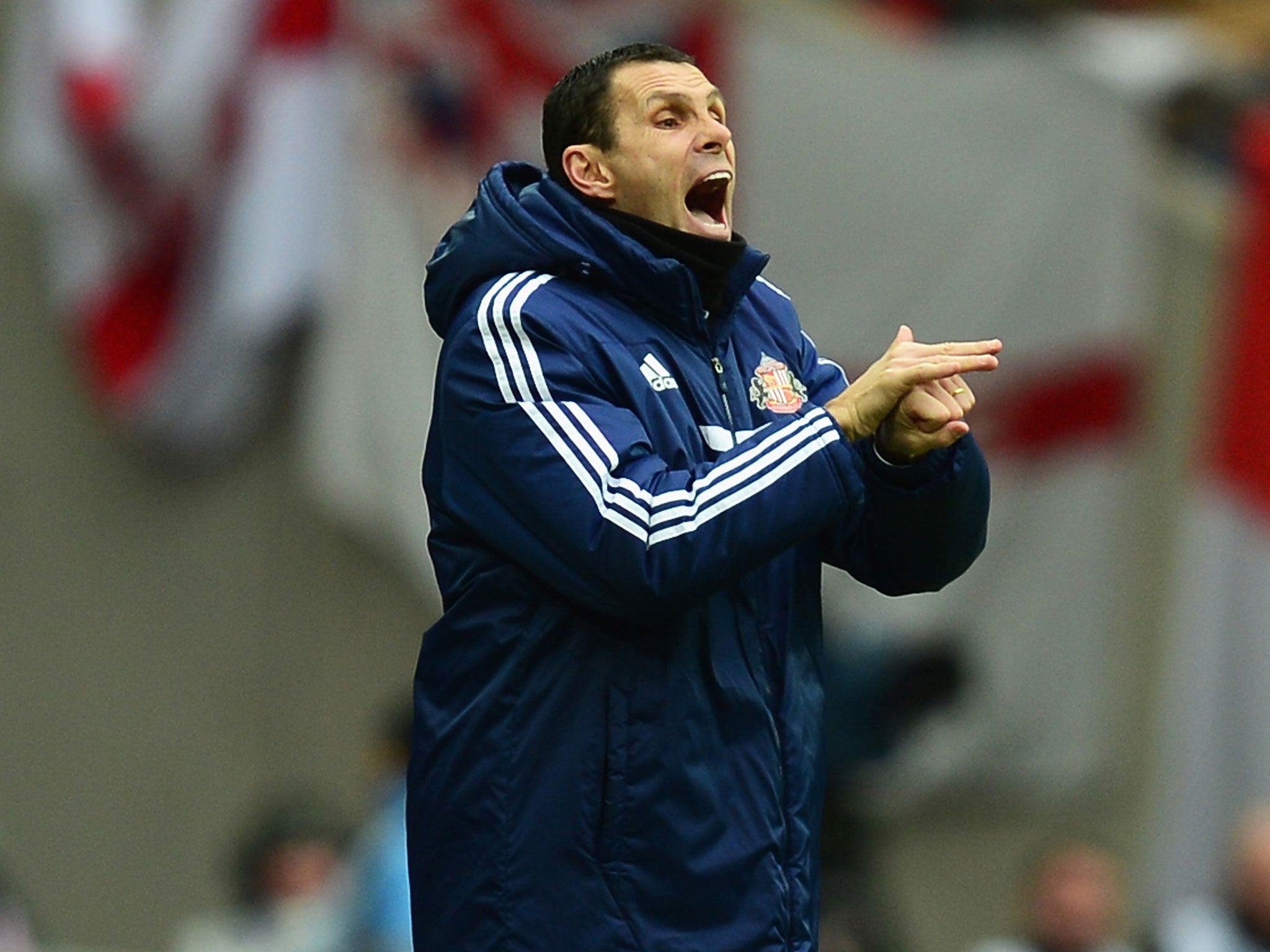Manchester City 3 Sunderland 1 - comment: Gus Poyet's pain after lifting Wembley, but not the Capital One Cup
Poyet's side lost 3-1 to Manchester City despite promising first half

The fabled recent history of teams, from Birmingham to Bradford, Swansea to Sunderland, who have arrived with modest resources and made the League Cup final an event to savour, has produced less predictable outcomes than this. But none has delivered a better performance than the one from the team Gus Poyet has reassembled.
By the end they were shot. Not even Craig Gardner, running and heaving like the wind under a 60-yard box-to-box sprint to halt Manchester City’s last and decisive counter attack, could make a material impression as Jesús Navas stepped into the path of the ball and dispatched it. But it was Sunderland who lifted the stadium, and delivered something even more ambitious than the supporters who had drenched Wembley Way in red by 11am could have imagined.
The way Poyet worked the environment was testament to the kind of gains he has made since he arrived at Sunderland and discovered a team crushed to the core by the regime of Paolo di Canio. This manager’s strategies reveal him to be everything that Di Canio was not. London had been awash with Wearsiders since Saturday night, so he had the team purposefully leave the hotel late for Wembley, in order that “we could make the players feel it,” as he later put it. “It was a great moment for the players to get into the stadium, though unfortunately we couldn’t take the Cup away.”
Quality told in the end – those two first-time City strikes in the space of a minute and 45 seconds revealing a talent that not even Poyet’s man management can deal with when world class delivers in such a way. But Sunderland will not die wondering what might have been.
“I wanted to see my team on the pitch and I saw my team,” Poyet said – the first, and most significant, words of his press conference.
Manchester City 3 Sunderland 1 player ratings
Show all 24We had expected something far more limited than that. Even Dennis Tueart – the totem of the 1973 FA Cup Final day when Sunderland delivered the definitive tale of the unexpected – predicted an Alamo, with occasional break-outs at best. The physical component duly materialised. Few players’ tackles leave Yaya Touré on his knees, though Marcos Alonso’s did. John O’Shea contained Fernandinho’s advance sorties for the large part of a game in which City were under the illusion that they could walk the ball through central areas.
But a containment philosophy does not seem to be in Poyet’s make-up. A game which they could have squared at 2-2 – had Steven Fletcher only managed to seize control of the ball Ki Sung-yueng leapt to head into his path a minute from time – was one that left the names of Ki, Lee Cattermole and Jack Colback written across Wembley. Samir Nasri’s nomination as man of the match was one of those decisions which comes of the need to square the post-match narrative with the result.
The goal which told us we had an afternoon on our hands did come in the counter-attacking form that we might have expected, when O’Shea – for whom the last five months under Poyet have brought a belated vindication for selecting Wearside to take life beyond Manchester United – stole possession from Fernandinho and ripped it to Adam Johnson. His beautiful ball to Fabio Borino surpassed even the quality of the Italian’s divine finish, with his outstep.
Thereafter, Johnson was the afternoon’s one disappointment. His remonstrations with Poyet midway through the first half suggested discontent with some aspect of the task he was set. But he didn’t take up the kind of advance positions that might have allowed him to threaten Pablo Zabaleta. He waltzed around Martin Demichelis on the half hour after receiving Phil Bardsley’s throw in, but an hour into the match he was gone. Johnson cast barely a glance at Poyet as he marched away, leaving Roy Hodgson to wonder whether the Johnson we have tanatalisingly started to see now he is free of Italian managers is for more than an England illusion.
Others were able to step in for him. Borini’s finish vindicated Brendan Rodgers’ commitment to sign him at Swansea and Liverpool, even though Anfield’s venomous strikeforce suggests his days there are done. It took the finest of Vincent Kompany to win the foot race with the Italian on 38 minutes and place a tackle. Colback displayed more of the quality that has seen this competition illuminated by the full raft of his abilities.
Cattermole, anchoring midfield and throwing out 30-yard passes revealed Poyet’s pragamatism. Despised by Di Canio and reduced to playing with the kids by the end, playing under Poyet has restored him to the player that Steve Bruce once thought he could be.
Both Ki and Alonso tested Costel Pantilimon after the break. When City rallied and scored, Sunderland rallied again. The introduction of Steven Fletcher created a level of threat that City’s substitutions lacked. And above of these players was Ki.
“It’s not nice when you are on the losing side,” Poyet reflected. “I hate it. But someone has to win. And put it in perspective. It was a final for the first time for many players. We didn’t make any mistakes today.”
Now he is left only with the aftermath of defeat – including next weekend’s FA Cup quarter-final against Hull City, which in all honesty he could do without, but it’s hard to imagine that Poyet will flirt with that occasion.
Subscribe to Independent Premium to bookmark this article
Want to bookmark your favourite articles and stories to read or reference later? Start your Independent Premium subscription today.

Join our commenting forum
Join thought-provoking conversations, follow other Independent readers and see their replies